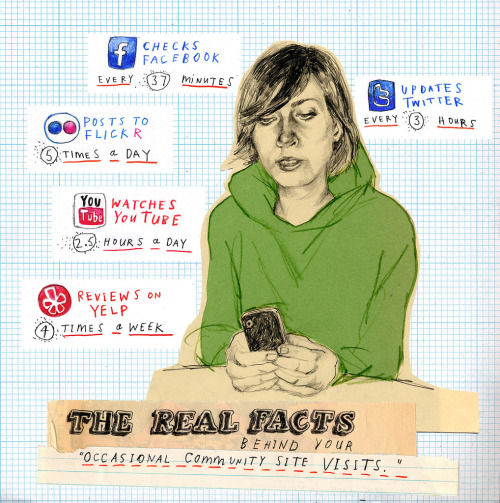Twitter and Facebook don't connect people – they isolate them from reality...

Guardian The way in which people frantically communicate online via Twitter, Facebook and instant messaging can be seen as a form of modern madness, according to a leading American sociologist.
"A behaviour that has become typical may still express the problems that once caused us to see it as pathological," MIT professor Sherry Turkle writes in her new book, Alone Together, which is leading an attack on the information age.
Turkle's book, published in the UK next month, has caused a sensation in America, which is usually more obsessed with the merits of social networking. She appeared last week on Stephen Colbert's late-night comedy show, The Colbert Report. When Turkle said she had been at funerals where people checked their iPhones, Colbert quipped: "We all say goodbye in our own way."
Turkle's thesis is simple: technology is threatening to dominate our lives and make us less human. Under the illusion of allowing us to communicate better, it is actually isolating us from real human interactions in a cyber-reality that is a poor imitation of the real world.
Social networking under fresh attack as tide of cyber-scepticism sweeps US
The list of attacks on social media is a long one and comes from all corners of academia and popular culture. A recent bestseller in the US, The Shallows by Nicholas Carr, suggested that use of the internet was altering the way we think to make us less capable of digesting large and complex amounts of information, such as books and magazine articles. The book was based on an essay that Carr wrote in the Atlantic magazine.

It was just as emphatic and was headlined: Is Google Making Us Stupid?
Another strand of thought in the field of cyber-scepticism is found in The Net Delusion, by Evgeny Morozov. He argues that social media has bred a generation of "slacktivists". It has made people lazy and enshrined the illusion that clicking a mouse is a form of activism equal to real world donations of money and time.
Other books include The Dumbest Generation by Emory University professor Mark Bauerlein – in which he claims "the intellectual future of the US looks dim"– and We Have Met the Enemy by Daniel Akst, which describes the problems of self-control in the modern world, of which the proliferation of communication tools is a key component.
Turkle's book, however, has sparked the most debate so far. It is a cri de coeur for putting down the BlackBerry, ignoring Facebook and shunning Twitter. "We have invented inspiring and enhancing technologies, yet we have allowed them to diminish us," she writes... the social media generation, suggesting that Facebook was created by people who failed to fit in with the real world.
Is this creating the uncivil culture that has no empathy?
Fellow critics point to numerous incidents to back up their argument. Recently, media coverage of the death in Brighton of Simone Back focused on a suicide note she had posted on Facebook that was seen by many of her 1,048 "friends" on the site. Yet none called for help – instead they traded insults with each other on her Facebook wall. Read on at Guardian